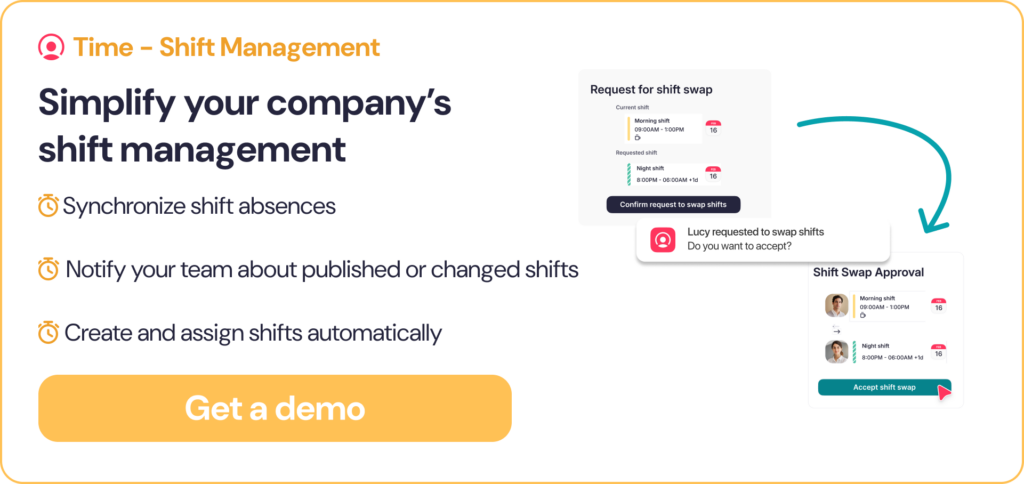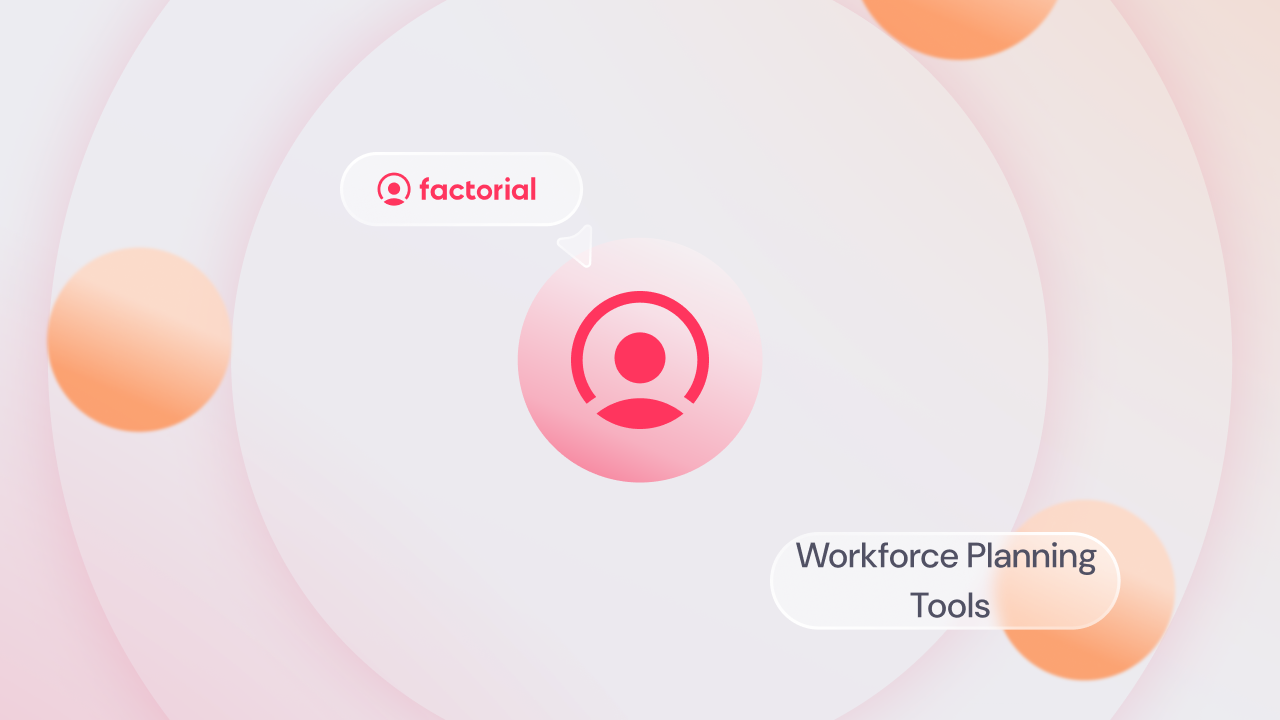Thus, ensuring you have the right people working at the right time can be challenging for the hospitality industry because it is hard to predict customer numbers, high staff turnover and shifts that often involve unsociable hours. In this article we look at why time management software is essential for hospitality businesses and provide some examples of options to consider.
What is Hospitality Time Management Software?
Features of Hospitality Software
Time management software can have the following features:
- Timekeeping and clocking in and out
- Creating rotas
- Delivering timesheet reports
- Liaising with payroll
- Recording absences and leave
Hospitality Time Management Software Benefits
1. Improved Scheduling and Rota Management
For hospitality managers, rotas and headaches go hand in hand. Stitching together shifts is like piecing together a jigsaw puzzle. Factor in absences, clashes and different staff locations and it’s like piecing together a jigsaw – blindfolded.
So it’s no wonder that employers across the country aren’t getting it right. Research carried out by The Living Wage Foundation revealed that nearly two-fifths of UK workers are given short notice of their working hours. This can throw off the work-life balance of employees and results in high stress and decreased motivation to perform well at work.
A key benefit of time management software is how easy it is to notify employees of shift changes. With one click, managers can send notifications, giving staff plenty of notice. More generally, it allows businesses to easily manage employee schedules and shifts, ensuring that they are always fully staffed during busy periods. It also helps to eliminate scheduling conflicts and ensure that staff are not overworked, reducing the risk of burnout and improving employee morale.
The sanity of the managers overseeing them is just as important. Software can increase visibility with a ‘calendar view’, displaying absences and holidays in different colours to help with forward planning. With real-time updates and notifications of shift change requests and cancellations, managers can quickly make changes to the schedule as needed, ensuring that their business runs like a well-oiled machine.

2. Increased Accuracy and Reliability
Using software can also make records more accurate and reliable. Traditional methods of tracking employee time, such as manual timecards and spreadsheets, are prone to inconsistencies.
With time management software, businesses can track employee hours in real-time, reducing the risk of errors and ensuring that they are always up-to-date on employee hours and pay. Managers can create timesheets they can trust with the click of a button and know that they’re reviewing precise information.
This extends to agency staff, too. Temporary employee hours can also be tracked and monitored, so if you’ve hired a few extra people to help over a busy period, their shifts can be monitored from the same place.
3. Ensure Compliance
Each of these are pulse-raising situations for any manager. It’s likely your staff will be on their feet for hours on end working ‘non-stop’ – but it’s crucial that they do. If not, you could be in breach of the Working Time Regulations which could result in fines and possible jail time.
These laws determine the working hours of employees over a working week and give workers the legal right to paid leave and specified rest breaks. They stipulate that employees are:
- Not allowed to work over 48 hours a week over a reference period, unless they opt out.
- Not allowed to exceed an average of eight hours work in 24 hours (for night workers)
- Entitled to 11 hours of rest between working days
- Allowed a 20 minute minimum rest break (defined below) if the working day is longer than six hours
- Entitled to 28 days paid time off for full-time workers per year
- Permitted a minimum of one day off per week.
- Restricted to eight hours per day or 40 hours per week (if over the compulsory school leaving age and up to 18 years).
Time tracking software ensures employees are taking the minimum amount of break-time per shift required by law. Staff can clock in and out of breaks, allowing everyone to keep track of rest periods. By digitising this process, managers gain increased visibility of breaks and total hours worked per day/week, empowering them to stay compliant.
Legal obligation isn’t the only incentive here. Enforcing breaks and sufficient time off improves employee wellbeing and brand reputation. Hospitality businesses have a bad rep for mistreating and overworking staff – don’t let your company be one of them!

4. Improved Time Tracking and Billing
The hospitality industry and its workers are usually busiest during what are considered ‘anti-social hours’, i.e. outside of the standard 9-5 realm. Shifts can start and end at different times for each employee, making it challenging to track punctuality and shift fulfillment. This variation can complicate efforts to ensure smooth operations and effective workforce management.
Time tracking software can help businesses keep track of employee hours, overtime and other time-related expenses. Managers can easily tell which employees have fulfilled their working shifts and compare this to the expected amount. In doing so, you can cut costs by identifying and combating ‘time theft’, i.e. when employees are paid for hours they didn’t work.
Time-related data can then be used to generate invoices, pay employees and manage expenses, reducing the risk of errors and improving the accuracy of payroll and financial reporting. Not to mention that time is of the essence in the relentlessly fast-moving world of hospitality. Automating and digitizing manual time management tasks gives managers valuable hours to prioritize customer satisfaction. They can also focus on improving workplace efficiency to reduce operating costs and boost the bottom line.
Best Hospitality Software for Employers
If you are looking for hospitality management software for your business, you will soon discover many options. Before you do anything, sit down and write a list of all your requirements when managing your staff and then prioritise them so you have a good idea of what you are looking for.
We’ve pulled together three of the best options for you here:
Factorial
Factorial’s time management software can help you with several tasks, streamlining the process of organising employee shifts and saving you money. The software combines three core elements for hospitality businesses: time-tracking supports employees with geolocation automatic checking in and out, shift management helps you plan rotas and communicate information to employees in one quick click, and time off manages employees’ leave requests and unplanned absences.
Additional features include:
- Create and download reports to help make data-driven decisions.
- Customiseable modules to work for your business.
- Easily accessible your profile via laptop, app, QR code or facial recognition.
- Track and manage your employees’ performances (includes free appraisal review templates!)
- Keep record of all your expenses: labour and product costs.
Schedule your free 14 day trial today! Transforming your business management has never been easier.
ADP
ADP has talked to hospitality businesses to ensure that their systems are designed to specifically meet the sector’s needs. Like Factorial, they have three different software elements: time and attendance, human capital management (HCM), and payroll services.
Within their HCM portal, you can manage your employees’ data, organise training, keep track of recruitment, and run payroll. ADP can help you track multiple jobs and multiple rates of pay across different locations.
HiBob
Another human resources information system (HRIS), HiBob, offers one central platform to meet many HR needs in the hospitality industry. Its platform automates and simplifies many of the daily tasks that need to happen to ensure the workforce is ready to work. Alongside its core HR, which manages employee data, specific sections manage time tracking, time off and attendance, onboarding, and payroll.
HiBob prides itself on its social media-like home page, which is intuitive to use, and allows you to integrate the platform with other apps and providers, such as Slack and Teams.



